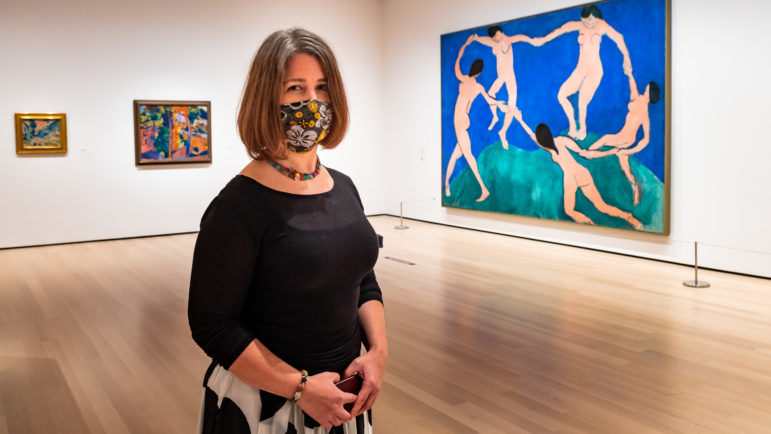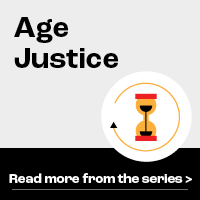Amid the fear and isolation of the pandemic, art discussions, history lectures and even new virtual ukulele lessons stimulate memory and keep older adults connected.

Adi Talwar
MOMA art historian Jennifer Katanic presents a weekly class, ‘Cafe des Artistes,’ to about 25 seniors.Denise Downing was never much into art.
Sure, she made the occasional visit to a Manhattan museum or checked out “little local things” here and there, but overall, she says, she found it kind of boring.
That changed around March, when Downing, alone in her Queens Village home, started to check out the Queens Public Library’s new online offerings, each intended to keep older adults connected during the COVID pandemic.
“There were so many art programs, so I said, ‘I’ll check this out.’” she says. “I couldn’t go anywhere or do anything anyway.’”
Soon Downing, 67, was hooked — by the content and format of the remote discussions, but also by the network she found in the little Webex tiles arrayed on her Chromebook.
“I’ve been entertained, I’ve learned some things and I’ve found some new interests,” she says.
She’s not alone. Hundreds of New York City-area seniors have participated in the QPL art classes, forging bonds via teleconference or, for individuals unable to access the Internet, by phone. Overall, QPL’s Older Adult Services hosted nearly 400 sessions serving 3,000 seniors between April and July. Another 600 or so remote sessions were open to all participants.
The programs are part of an explosion of virtual meet-ups designed to offset the isolating impact of COVID-19 for older adults forced indoors, often alone, for their physical health.
“We’ve kind of formed a community,” says Kathy Neil, an art aficionado and longtime MOMA patron who participates in the same Thursday morning discussions as Downing. “These are people I’ve never seen in person, they’re online buddies, but we all share an interest and we like to come to the program.”
The hidden impact of COVID-19
Downing and Neil listened Sept. 3 as MOMA art historian Jennifer Katanic presented her weekly class, “Cafe des Artistes,” to about 25 seniors. Katanic invited attendees to voice their responses to the paintings and ideas she presented. Others entered questions and comments in a chat window.
A recent visit to an Atlanta Airbnb recalled the work of Marc Chagall, Katanic said as she kicked off the program with verdant photographs from the trip. It was her first time out of her Queens apartment in five months, she said.
The discussion evolved to focus on conceptual art of the mid 20th Century, with an examination of John Baldessari, a prolific artist who burned his paintings in a California crematorium for a 1970 project titled “Cremation Project.”
“That’s NUTS!” a woman named Sara wrote in the chat window beside the video presentation.
“Being nuts in California is par for the course,” Kalanic joked. She’s from California, so she can say those things.
Others weighed in with guidance on decluttering. “The idea of getting rid of one’s possessions so they don’t end up possessing you is an old one,” wrote Jonathan Kaufman.
A review of several self portraits by Vincent van Gogh — there are a lot, with and without ear — elicited banter about the original selfies.
Participants seemed to enjoy the free-flowing conversation.
“This series is very high on my priorities and I schedule around it,” says Jane Weiler, of Port Washington. “It’s improved my mental health. There are times I’ve been depressed and this helps.”
The tangible impact of the coronavirus on older adults is clear in the daily illness tolls reported by New York City and state. COVID-19 has killed nearly 24,000 New York City residents, the vast majority of whom are adults over age 65. Tens of thousands of others have fallen dangerously ill and survived, but with little sense of the lingering effects.
But the mental health consequences that Weiler referenced are less evident, though potentially deadly nonetheless
“Social distancing, though a major strategy to fight COVID‐19, is also a major cause of loneliness, particularly in settings like nursing‐care or old‐age homes which is an independent risk factor for depression, anxiety disorders, and suicide,” wrote psychiatrist Debanjan Banerjee in the May issue of The International Journal of Geriatric Psychiatry.
“Social connectedness is vital during the public health breakdown.”
That acknowledgment informs the work of Madlyn Schneider, who runs QPL’s Older Adult and Homebound programs. Once COVID-19 rules forced QPL to close its 66 branches, Schneider expanded the virtual classes she has organized for the past 10 years.
Art discussions, history lectures and even new virtual ukulele lessons stimulate memory and keep older adults connected. “We need that because older adults who were alone need the ability to socialize,” she says.
The programs are here to stay and have only grown QPL’s reach. New participants log in to the remote sessions from towns outside New York City, and even in other states, no library card required.
Access to interaction
Grammy-winning folk musician Dom Flemons took a break from an intimate performance August 26 to wish a special happy birthday to an audience member.
A woman named Ola had just turned 83. She giggled and waved as members of Brooklyn’s New York Memory Center joined Flemons and Alzheimer’s Poetry Project Director Gary Glazner to sing to her. Ola’s caregiver stood behind her, while others sat with their own loved ones or clients.
The New York Memory Center runs programs for seniors with dementia and caregivers who need support of their own throughout the day.
Flemons, a member of the Carolina Chocolate Drops, performed songs from his album “Black Cowboys” and discussed his research into the contributions of African Americans in the West while 12 participants watched and talked by teleconference as part of the monthly Memory Arts Cafe series.
New York Memory Center executive director Josephine Brown says the virtual programs benefit participants with Alzheimers and dementia, but even more importantly provide a reprieve for some families and caregivers also isolated at home.
“I notice caregivers are not as anxious on the days of the programs,” Brown says. “They can feel more isolated than our members.”
Still, many older adults and their caregivers are now more disconnected than ever. The monthly Memory Arts Cafe attendance has gone from 30-40 people per session to 15 to 20, says Glazner.
Brown says overall participation has decreased because many family members who serve as caregivers often work remotely and can’t always take time to assist with the program.
“The socialization part is really gone for a lot of them because they’re not here in a group with each other,” she says.
Without reliable Internet, they can’t even join the remote programs. Nursing home participation has all but disappeared, she says.
The same is true at Queens Public Library, says Schneider, the system’s older adult program coordinator.
About 120 nursing homes have stopped participating in QPL’s book delivery service because they do not allow visitors to distribute and pick up the paperbacks, Schneider says. She’s trying to encourage recreation directors to sign up individual residents for mail service.
A lack of reliable Internet or web-enabled devices cuts off hundreds of thousands of New York City seniors from services during the pandemic. About 42 percent of New Yorkers over 65 do not have broadband internet access, Comptroller Scott Stringer’s office reported last year.
“It’s been a scary time,” says Beth Weeks, a registered nurse and the co-founder of Senior Living Consultants of New York. “There are potentially deadly effects of social isolation for seniors.”
Weeks’ organization helps older adults and their families find appropriate assisted living facilities. She says she has kept tabs on how various sites have adapted to keep seniors connected, but the efforts often depend on resources and staffing.
An ‘imperfect substitute’
A few Upper West Side homes have gone above and beyond to link residents with virtual programming, including art therapy and discussions, she says.
Nursing homes — particularly those serving low-income New Yorkers — have not, says Flushing Assemblymember Ron Kim.
Socialization and mental health took a backseat to the acute crisis of simply keeping residents alive during the peak of the pandemic, says Kim, who sponsored legislation to limit legal immunity for New York nursing homes where COVID surged.
“Once we normalize, we can go back and figure out what are some of these supplementary and complementary programs that can help with mental health,” he says.
Groups representing nursing homes say the facilities have worked to keep residents engaged, by purchasing web-enabled devices to facilitate activities and tapping community resources. LeadingAge New York, which represents non-profit and government-run long-term care facilities, has compiled a list of remote resources for members.
At the same time, says LeadingAge President and CEO James Clyne, nursing homes “have hired additional staff and re-deployed existing staff to assist residents, 1-on-1, in using technology to engage in activities and visit with loved ones remotely.”
Nevertheless, virtual programs remain an “imperfect substitute” for in-person socialization, Clyne says.
“Many residents have difficulty comprehending or appreciating virtual activities due to cognitive limitations or medical conditions,” he adds. “They miss in-person contact with friends, neighbors and family members.”
City Limits’ reporting on the intersection of art and policy is supported by the Laurie M. Tisch Illumination Fund. City Limits is solely responsible for all content.










9 thoughts on “NYC’s Older Adults Find Community in Remote Art Programs”
You know SAGE has an amazing virtual program at this time for their elders. Along with Art , both practical and educational, there are exercise groups, language, movies etc etc..
Thank you! I will check that out!
Please sign me up for the virtual programs and let me know the schedule and zoom number.
Hi Ruth, if you want to find more information about the virtual programs, check out this link: https://www.leadingageny.org/topics/coronavirus/social-isolation-resources/
hi ruth, there is also http://www.seniorplanet.org and they have many, many online, virtual classes. they are pretty good. also the queens library virtual programs give you access to Learn It Live i have found nice programs there also, and the library also gives access to the great courses thru rbdigital ( which you have to access with your library card info )
hope you find this info helpful!
muriel
Hello. Where are the links to the programs mentioned? Am I missing them? Thank you.
Hi there, if you want to find more information about the virtual programs, check out this link: https://www.leadingageny.org/topics/coronavirus/social-isolation-resources/
hi susansa, there is also http://www.seniorplanet.org and they have many, many online, virtual classes. they are pretty good. also the queens library virtual programs give you access to Learn It Live i have found nice programs there also, and the library also gives access to the great courses thru rbdigitalcom ( which you have to access with your library card info )
hope you find this info helpful!
muriel
hi susansa, there is also http://www.seniorplanet.org and they have many, many online, virtual classes. they are pretty good. also the queens library virtual programs give you access to Learn It Live i have found nice programs there also, and the library also gives access to the great courses thru rbdigital ( which you have to access with your library card info )
hope you find this info helpful!
muriel